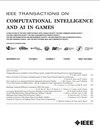Review of the Use of AI Techniques in Serious Games: Decision Making and Machine Learning
Q2 Computer Science
IEEE Transactions on Computational Intelligence and AI in Games
Pub Date : 2017-06-01
DOI:10.1109/TCIAIG.2015.2512592
引用次数: 33
Abstract
The video game market has become an established and ever-growing global industry. The health of the video and computer games industry, together with the variety of genres and technologies available, means that video game concepts and programmes are being applied in numerous different disciplines. One of these is the field known as serious games. The main goal of this paper is to collect all the relevant articles published during the last decade and create a trend analysis about the use of certain artificial intelligence algorithms related to decision making and learning in the field of serious games. A categorization framework was designed and outlined to classify the 129 papers that met the inclusion criteria. The authors made use of this categorization framework for drawing some conclusions regarding the actual use of intelligent serious games. The authors consider that over recent years enough knowledge has been gathered to create new intelligent serious games to consider not only the final aim but also the technologies and techniques used to provide players with a nearly real experience. However, researchers may need to improve their testing methodology for developed serious games, so as to ensure they meet their final purposes.回顾AI技术在严肃游戏中的应用:决策制定和机器学习
电子游戏市场已经成为一个成熟且不断发展的全球性产业。电子游戏和电脑游戏产业的健康发展,加上游戏类型和技术的多样性,意味着电子游戏的概念和程序正被应用于许多不同的学科。其中之一就是严肃游戏领域。本文的主要目标是收集过去十年中发表的所有相关文章,并创建一个关于在严肃游戏领域中使用与决策和学习相关的某些人工智能算法的趋势分析。设计并概述了分类框架,对符合纳入标准的129篇论文进行分类。作者利用这一分类框架得出了一些关于智能严肃游戏实际使用的结论。作者认为,近年来已经收集了足够的知识来创造新的智能严肃游戏,不仅要考虑最终目标,还要考虑为玩家提供近乎真实的体验所使用的技术和技巧。然而,研究人员可能需要改进他们开发的严肃游戏的测试方法,以确保它们达到最终目的。
本文章由计算机程序翻译,如有差异,请以英文原文为准。
求助全文
约1分钟内获得全文
求助全文
来源期刊

IEEE Transactions on Computational Intelligence and AI in Games
COMPUTER SCIENCE, ARTIFICIAL INTELLIGENCE-COMPUTER SCIENCE, SOFTWARE ENGINEERING
CiteScore
4.60
自引率
0.00%
发文量
0
审稿时长
>12 weeks
期刊介绍:
Cessation. The IEEE Transactions on Computational Intelligence and AI in Games (T-CIAIG) publishes archival journal quality original papers in computational intelligence and related areas in artificial intelligence applied to games, including but not limited to videogames, mathematical games, human–computer interactions in games, and games involving physical objects. Emphasis is placed on the use of these methods to improve performance in and understanding of the dynamics of games, as well as gaining insight into the properties of the methods as applied to games. It also includes using games as a platform for building intelligent embedded agents for the real world. Papers connecting games to all areas of computational intelligence and traditional AI are considered.
 求助内容:
求助内容: 应助结果提醒方式:
应助结果提醒方式:


